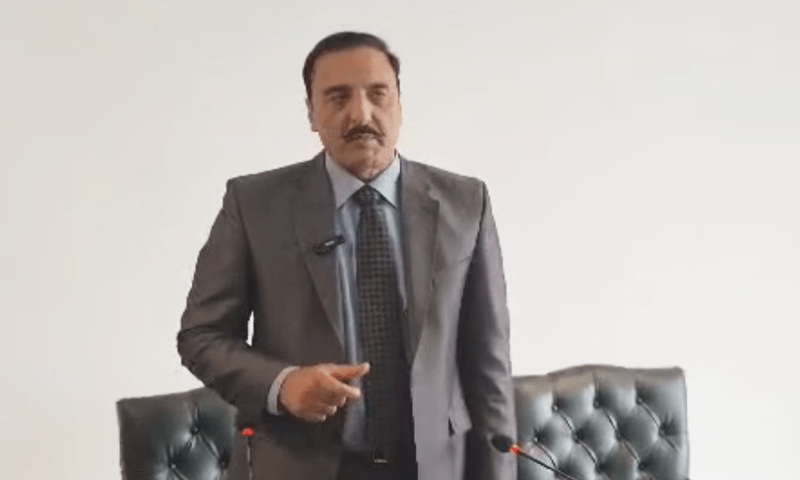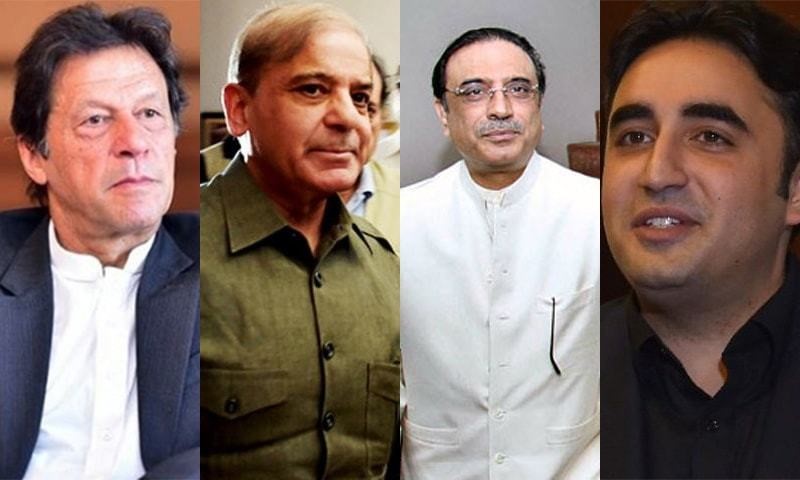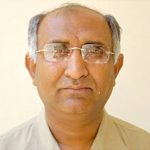
Former commissioner of Rawalpindi Chatha stepped down from his position on February 17, 2024, after confessing to manipulating the elections in favor of certain candidates
Prof Dr. Abdullah G Arijo

The involvement of Liaquat Ali Chatha, the former commissioner of Rawalpindi, in the 2024 Pakistan elections is being scrutinized. As per media reports, Chatha stepped down from his position on February 17, 2024, after confessing to manipulating the elections in favor of certain candidates. He further alleged that the chief election commissioner and chief justice were also involved in the conspiracy. Expressing remorse for his actions and acknowledging the betrayal of the people of Rawalpindi, he requested to be held accountable for his wrongdoing. The Election Commission of Pakistan rejected Chatha’s allegations and said it would launch a probe into the matter. The Pakistan Tehreek-e-Insaf (PTI) party, led by jailed former Prime Minister Imran Khan, has been protesting against the alleged rigging and demanding a re-election. The results of the February 8 polls gave a narrow victory to the Pakistan Muslim League-Nawaz (PML-N) party, headed by former Prime Minister Nawaz Sharif.
The recent confession made by Chatha has sparked concerns regarding the legitimacy and openness of the electoral system in Pakistan. This has further contributed to the prevailing political unrest and ambiguity within the nation. The results of the upcoming 2024 elections will hold immense significance in shaping the course of democracy, stability, and security in Pakistan. More or less all elections in Pakistan. Have been controversial. Pakistan has a long history of controversial elections, marked by allegations of rigging, violence, censorship, and military interference.
The recent confession made by Chatha has sparked concerns regarding the legitimacy and openness of the electoral system in Pakistan
Here are some of the most disputed elections in Pakistan’s history.
1977: The Pakistan National Alliance (PNA), comprising nine right-wing opposition parties, leveled allegations of extensive electoral fraud against Prime Minister Zulfikar Ali Bhutto and his Pakistan People’s Party (PPP). As a result, the PNA initiated a widespread protest movement across the nation that unfortunately escalated into violence, ultimately resulting in martial law and the execution of Bhutto by General Zia-ul-Haq.
In 1990, President Ghulam Ishaq Khan ousted the PPP, which was led by Benazir Bhutto, due to allegations of corruption and incompetence. The IJI, a coalition of conservative parties supported by the military and intelligence agencies, won the election amidst accusations of manipulation and bribery. A subsequent judicial inquiry uncovered that the army had provided substantial sums of money to multiple politicians to secure the PPP’s defeat.
Also read: RIGGING RUMOURS
2002: After the military coup of 1999 that toppled Prime Minister Nawaz Sharif and brought General Pervez Musharraf to power, the elections were held under a controversial constitutional amendment that gave Musharraf sweeping powers to dismiss the parliament and the prime minister. The Pakistan Muslim League Quaid-e-Azam (PML-Q), a pro-Musharraf faction of Sharif’s party, emerged as the largest party, while the Muttahida Majlis-e-Amal (MMA), an alliance of religious parties, made significant gains. The PPP and the Pakistan Muslim League Nawaz (PML-N), the two main opposition parties, boycotted the presidential referendum and challenged the legitimacy of the elections.
2018: The PTI, led by former cricket star Imran Khan, won the elections with a thin majority, ending the decades-long dominance of the PPP and the PML-N. However, the elections were marred by allegations of pre-poll and post-poll rigging, media censorship, judicial bias, and military meddling. The PML-N and the PPP rejected the results and accused the establishment of engineering the elections in favor of the PTI.
2024: The most recent elections were also the most controversial in the country’s history, according to some observers. The Election Commission imposed legal barriers on the candidates of the PTI, forcing them to run as independents. The PTI claimed that the elections were rigged and refused to join a coalition government. The PML-N and the PPP also alleged widespread irregularities and manipulation. The elections were overshadowed by a countrywide mobile phone shutdown, violent attacks, and a delayed announcement of the results.
 The government in Islamabad is currently in a state of uncertainty, as no single party has won a clear majority in the general elections held on Feb. 8, 2024.
The government in Islamabad is currently in a state of uncertainty, as no single party has won a clear majority in the general elections held on Feb. 8, 2024.
The formation of a new government in Islamabad has been facing difficulty since the 2024 general elections, which resulted in a hung parliament. No single party or alliance secured a clear majority in the National Assembly, the lower house of the parliament. The Pakistan Tehreek-e-Insaf (PTI), led by former Prime Minister Imran Khan, emerged as the largest party with 105 seats, but fell short of the required 172 seats to form the government. The Pakistan Muslim League-Nawaz (PML-N), led by former prime minister Nawaz Sharif’s brother Shehbaz Sharif, came second with 95 seats, followed by the Pakistan People’s Party (PPP), led by Bilawal Bhutto Zardari, with 54 seats.
The latest on the PPP PMLN alliance on election 2024 is that they have reached a formal agreement to form a new coalition government, with Shehbaz Sharif as the prime minister and Asif Zardari as the president. They have also announced their joint candidate for the speaker of the National Assembly, Khursheed Shah. The alliance has claimed to have the support of 175 members in the 266-seat lower house of parliament.
The alliance has faced criticism from Imran Khan’s PTI party, which has accused them of being “mandate thieves” and challenged the election results in the courts. The PTI has also demanded the resignation of the head of the Election Commission, Sikandar Sultan Raja, for allegedly failing to conduct the elections in a free and fair manner.
The PPP PMLN alliance has said that their aim is to address the country’s economic crisis and restore democracy and the rule of law. They have also vowed to work with other parties and stakeholders for the stability and prosperity of Pakistan.
The government in Islamabad is currently in a state of uncertainty, as no single party has won a clear majority in the general elections held on Feb. 8, 2024. The Pakistan Tehreek-e-Insaf (PTI) of former Prime Minister Imran Khan, who was detained in 2022, emerged as the largest party with 93 seats but fell short of the 169 seats required to form a government. The Pakistan Muslim League Nawaz (PMLN) of another former Prime Minister, Nawaz Sharif, came in second with 75 seats, followed by the Pakistan People’s Party (PPP) of Bilawal Bhutto Zardari with 54 seats.
The political parties have until Feb. 29, 2024, to form a coalition government or face a hung parliament. There are several possible scenarios for the formation of the next government, such as:
A coalition between the PMLN and the PPP, along with some smaller parties and independent candidates. This would give them a two-thirds majority in the parliament and the ability to choose the next prime minister and president. However, this would also require them to overcome their ideological differences and agree on a power-sharing formula.
A coalition between the PTI and some smaller parties and independent candidates. This would give them a simple majority in the parliament and the chance to form a minority government. However, this would also make them vulnerable to defections and instability, as well as face opposition from the PMLN and the PPP.
Also read: New setup in sight but rocky road ahead for Pakistan’s new government
A coalition between the PTI and the PMLN, or the PTI and the PPP. This would give them a comfortable majority in the parliament and the opportunity to form a national unity government. However, this would also require them to set aside their bitter rivalry and personal animosity, as well as compromise on their policy agendas.
The speculations about the outcome of the government formation are varied and uncertain, as the political parties are still engaged in negotiations and consultations. The final decision will depend on the preferences and interests of the party leaders, the military, the judiciary, and the public. The next government will also have to deal with the challenges of the economy, the pandemic, the security, and the foreign relations of Pakistan.
__________________
 Prof. (R) Dr. Abdullah G. Arijo is Advisor and Visiting Professor, SBBUVAS, Sakrand, Pakistan. He is Ex-Chairman, Department of Parasitology, Sindh Agriculture University and Ex-Advisor Academics & P&D to Vice Chancellor SAU Tandojam
Prof. (R) Dr. Abdullah G. Arijo is Advisor and Visiting Professor, SBBUVAS, Sakrand, Pakistan. He is Ex-Chairman, Department of Parasitology, Sindh Agriculture University and Ex-Advisor Academics & P&D to Vice Chancellor SAU Tandojam
A very deep observation.